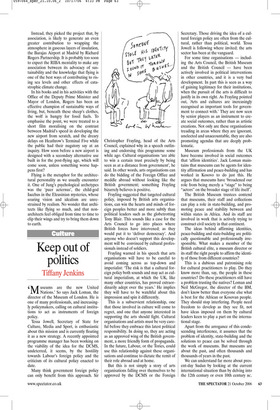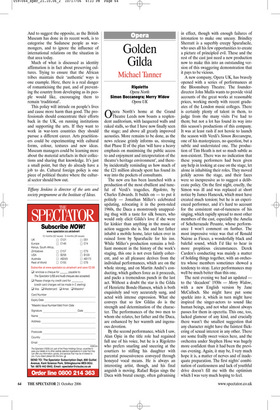Keep out of politics
Tiffany Jenkins
‘Museums are the new United Nations.’ So says Jack Loman, the director of the Museum of London. He is one of many professionals, and increasingly policymakers, calling on cultural institutions to act as instruments of foreign policy.
Tessa Jowell, Secretary of State for Culture, Media and Sport, is enthusiastic about this mission and is currently floating it as a new strategy. A recently appointed programme manager has been working on the viability of the idea for the DCMS, undeterred, it seems, by the hostility towards Labour’s foreign policy and the criticism of its cultural policy enacted to date.
Many think government foreign policy can only benefit from this approach. Sir Christopher Frayling, head of the Arts Council, explained why in a speech outlining and endorsing this programme some while ago. Cultural organisations ‘are able to win a certain trust precisely by being seen as at a distance from government’, he said. In other words, arts organisations can do the bidding of the Foreign Office and meddle abroad without looking like the British government; something Frayling bizarrely believes is positive.
Frayling suggested that targeted cultural policy, imposed by British arts organisations, can win the hearts and minds of foreign peoples better and more subtly than political leaders such as the globetrotting Tony Blair. This sounds like a case for the Arts Council to go into places where British forces have intervened; as they would put it to ‘deliver democracy’. And anyone who doesn’t support this development will be convinced by cultural professionals instead of soldiers.
Frayling warned in his speech that arts organisations will have to be careful to avoid coming across as top-down and imperialist: ‘The risk is that a cultural foreign policy both sounds and may act as cultural imperialism, at which the UK, like many other countries, has proved extraordinarily adept over the years.’ He implies they will have to be watchful about this impression and spin it differently.
This is a subservient relationship, one that those involved in culture will come to regret, and one that anyone interested in supporting the arts should fight. Cultural organisations and artists must be very careful before they embrace this latest political responsibility. In doing so, they are acting as an approved wing of the British government, a more friendly form of propaganda. In the future, Labour, or the Tories, could use this relationship against these organisations and continue to dictate the remit of their role abroad and at home.
But this is not simply a story of arts organisations falling over themselves to be approved by the DCMS or the Foreign Secretary. Those driving the idea of a cultural foreign policy are often from the cultural, rather than political, world. Tessa Jowell is following where invited; the arts sector has been at the vanguard.
For some time organisations — including the Arts Council, the British Museum and the British Council — have been actively involved in political interventions in other countries, and it is a very bad development. In part this is seen as a way of gaining legitimacy for their institutions, when the pursuit of the arts is difficult to justify in its own right. As Frayling pointed out, ‘Arts and cultures are increasingly recognised as important tools for government to connect with.’ They are now seen by senior players as an instrument to create social outcomes, rather than as artistic creations. Not only are these organisations treading in areas where they are ignorant, unelected and unaccountable, they are also promoting agendas that are deeply problematic.
Museum professionals from the UK have become involved in social outcomes that ‘affirm identities’. Jack Loman maintains that museums can be agents for identity affirmation and peace-building and has worked in Kosovo to do just this. He argues that museums have ‘broadened our role from being merely a “stage” to being “actors” on the broader stage of life itself’.
The British Museum trustees contend that museums, their staff and collections can play a role in state-building, and promoting peace and stability between and within states in Africa. And its staff are involved in work that is actively trying to construct civil society in that continent.
The ideas behind affirming identities, peace-building and state-building are politically questionable and professionally irresponsible. What makes a member of the British cultural elite, a museum director or its staff the right people to affirm the identity of those from different countries?
This is a dubious and patronising role for cultural practitioners to play. Do they know more than, say, the people in these countries? Do these practitioners still have a problem trusting the natives? Loman and Neil McGregor, the director of the BM, don’t know better than everyone else what is best for the African or Kosovan people. They should stop interfering. People need freedom to develop as they see fit, not have ideas imposed on them by cultural leaders keen to play a part on the international stage.
Apart from the arrogance of this condescending interference, it assumes that the problem of identity, state-building and the solutions to peace can be solved through the work of museums. But museums are about the past, and often thousands and thousands of years in the past.
We can understand far more about present-day Sudan by looking at the current international situation than by delving into the 12th century or even 10th century BC. And to suggest the opposite, as the British Museum has done in its recent work, is to categorise the Sudanese people as warmongers, and to ignore the influence of international relations on the situation in that area today.
Much of what is discussed as identity affirmation is in fact about preserving cultures. Trying to ensure that the African tribes maintain their ‘authentic’ ways is one example. Here, there is a real danger of romanticising the past, and of preventing the country from developing as its people would like, encouraging them to remain ‘traditional’.
This policy will intrude on people’s lives and cause more harm than good. The professionals should concentrate their efforts back in the UK, on running institutions and supporting the arts. If they want to work in war-torn countries they should pursue a different career. Arts practitioners could be experimenting with cultural forms, colour, textures and new ideas. Museum managers could be learning more about the material artefacts in their collections and sharing that knowledge. It’s just a small point, but they do already have a job to do. Cultural foreign policy is one piece of political theatre where the cultural sector should bow out.



































































































 Previous page
Previous page